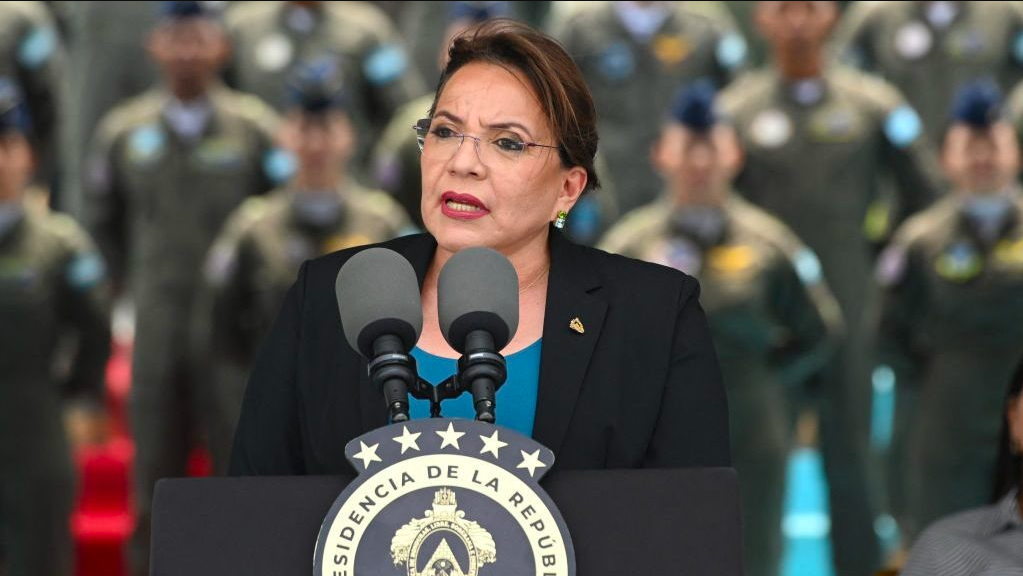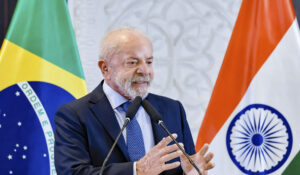
Published 04/09/2024 17:42 | Edited 04/09/2024 19:34
The diplomatic crisis between Honduras and the United States reached a new level after Honduran President Xiomara Castro publicly denounced an alleged coup d’état in progress, orchestrated with the help of Washington. According to the president, the plan was being orchestrated by the United States ambassador in Tegucigalpa, Laura Dogu, with the aim of creating a division within the country’s Armed Forces.
In a public statement, Xiomara Castro warned that the coup was being planned by “dark forces” seeking to destabilize her socialist and democratic government. “I want to tell you that a plan is being drawn up against our government. Yesterday, they attacked the commander-in-chief of the Armed Forces and the Minister of Defense of our country,” the president said, referring to General Rossvelt Hernández, a military leader loyal to her government.
Hours earlier, Honduran Foreign Minister Enrique Reina had revealed in an interview with local television channel Televicentro that the country’s intelligence had detected a plot to divide the Armed Forces. According to Reina, the US ambassador was offering support to a dissident group within the armed forces in exchange for an uprising against Hernández.
Read also: A woman presides over Honduras: what to expect from Xiomara Castro’s government?
“Honduras will break debt bonds,” says Libre leader
Who is Xiomara Castro, Honduras’ left-wing presidential candidate?
Honduras: The left returns to heal the wounds of the 2009 coup
Biased narratives and media destabilization
In addition to accusations of military interference, Xiomara Castro denounced an attempt to destabilize the country through “biased narratives” promoted by national and foreign media outlets. According to her, these narratives seek to link officials in her government to drug trafficking, based on information released by US media outlets and statements by Ambassador Dogu.
“The plan to destroy this socialist and democratic government is underway. The dark forces of 2009, with the support of the same national and international media, are reorganizing,” Castro said, recalling the coup that overthrew her husband, former President Manuel Zelaya, in 2009.
Ambassador Dogu, in controversial statements, suggested that the head of the Honduran Armed Forces, Roosevelt Hernández, and the Minister of Defense, José Manuel Zelaya, could be involved in drug trafficking, an accusation that generated outrage and distrust on the part of the Honduran government. Xiomara Castro, in a speech broadcast on national television, stated that these accusations were part of a larger plan to destabilize her government and promote a coup d’état, similar to the one that occurred in 2009, which deposed her husband, Manuel Zelaya.
The decision to cancel the extradition treaty
The situation has been intensified by Honduras’ decision to unilaterally cancel its extradition treaty with the United States, a measure seen by Castro as essential to protect national sovereignty and prevent external interference. The rapprochement with Venezuela, a country facing harsh sanctions and international pressure, especially from the United States, has also contributed to the tension.
On August 29, the Honduran government took the drastic step of canceling its extradition treaty with the United States. The agreement, which allowed Honduran citizens to be transferred to the United States to face trial, was seen as a crucial tool in the fight against drug trafficking, especially during the previous administration of Juan Orlando Hernández. The former Honduran president was extradited to the United States and convicted of drug trafficking, which highlighted the importance of the treaty.
However, for Xiomara Castro’s government, the agreement began to be perceived as a threat to internal political stability. According to Honduran Foreign Minister Enrique Reina, the treaty could be used as a “political weapon” against members of the current government, especially after statements by the US ambassador to Honduras, Laura Dogu, insinuating links between high-ranking Honduran officials and drug cartels.
In August 2024, a meeting between Honduran authorities and Venezuelan Defense Minister Vladimir Padrino López served as the trigger for the crisis. López is a controversial figure, sanctioned by the US for alleged links to drug trafficking, although concrete evidence of these allegations has not yet been presented.
The international reaction and the implications for sovereignty
The decision to cancel the extradition treaty was criticized by sectors of the Honduran opposition, who accused Xiomara Castro of trying to protect members of her family and political allies from US investigations. However, for the Honduran government, the measure is a necessary defense of national sovereignty. Foreign Minister Reina appealed to the principle of self-determination of peoples and non-interference in internal affairs, principles enshrined in the United Nations Charter.
The crisis also raises questions about Honduras’ relations with other countries, especially Venezuela. Tegucigalpa’s rapprochement with Caracas represents a significant shift in Honduran foreign policy, which had previously been more aligned with U.S. interests in the region. This new stance challenges the status quo and places Honduras in a delicate position in Latin American geopolitics.
Venezuelan President Nicolás Maduro has expressed his support for Xiomara Castro, condemning the alleged coup attempt. In his weekly program “Con Maduro Más,” the Venezuelan leader stated that the attack on Xiomara is also an attack on the Community of Latin American and Caribbean States (CELAC), an organization that she currently presides over.
Maduro stressed that the United States is trying to divide Latin America and the Caribbean, aiming to weaken CELAC and impose its neocolonial agendas. “The objective of the gringos is to destroy CELAC,” declared Maduro, reiterating his support and solidarity with the Honduran president. He also praised Castro’s “courage and bravery” in defending Honduras’ sovereignty against the “imperial pretensions” of the United States.
The diplomatic crisis between Honduras and the United States is a striking example of the complex power relations in Latin America, where U.S. influence and the defense of national sovereignty often clash. The possibility of new tensions or even internal conflict in Honduras is causing alarm in the government and national stability, given the history of coups in the region, with U.S. support. How events unfold will determine the balance of power in the region and the role of the United States in the internal political dynamics of Honduras.
Source: vermelho.org.br

